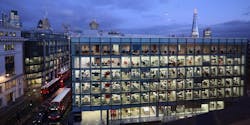Ford Dearborn Truck Plant Celebrates 10 Years of Sustainable Manufacturing
As the centerpiece of its Rouge Center, Dearborn Truck Plant was created as part of the company's vision of sustainable manufacturing, Ford Motor Co. said on May 19 as it celebrated the 10-year anniversary of the plant.
"Dearborn Truck Plant has set world-class standards for efficiency and environmentally friendly manufacturing processes,” said Bruce Hettle, vice president, Ford North America manufacturing. “There is no better way to celebrate 10 years of top-notch manufacturing than gearing up to build the all-new F-150. “
Later this year, production of the new 2015 Ford F-150 gets under way at the plant. Ford points out that the new truck will use advanced materials including high-strength steel as well as high-strength, military-grade, aluminum alloy throughout the vehicle body. In addition to a new 2.7-liter EcoBoost engine, the 2015 F-150 features a lineup of powertrains to let drivers choose the truck that best fits their needs. In addition to the 3.5-liter EcoBoost engine, an all-new normally aspirated 3.5-liter V6 debuts along with an improved 5.0-liter V8.
Dearborn Truck Plant has produced more than 2.6 million F-150 trucks since it opened in May 2004. Once home to the iconic Ford Mustang, the plant now has more than 3,600 employees on a three-crew operating pattern producing 1,200 F-150 trucks daily. The plant is capable of building up to nine models on three vehicle platforms. It has close to 350 robots between its body and paint shops and final assembly area.
Living roof and sustainability efforts
Dearborn Truck Plant’s roof, which was installed in 2004, was once the world’s largest living roof according to Guinness World Records and it is now the largest in North America. At 10.4 acres, the living roof sustains a diverse ecosystem, removes carbon dioxide from the atmosphere and reduces energy use. It is part of a storm water management system that reduces runoff and costs two-thirds less than a conventional water treatment process.
The facility maximizes the use of natural light and ventilation to reduce the financial and environmental costs of heating, cooling and powering the plant. The paint shop uses water-based primer and base coat systems that minimize harmful volatile emissions while also maintaining paint quality.
Other sustainable practices include recyclable packaging and a total waste management system that incorporates transportation, disposal, recycling, reclamation and reuse of plant waste is in operation. To date, the facility has recycled more than 20 million pounds of cardboard, paper, plastic and wood.
About the Author

Adrienne Selko
Senior Editor - MH&L, IW, & EHS Today
Adrienne Selko has written about many topics over the 17 years she has been with Endeavor Business Media and currently focuses on workforce development strategies. Previously Adrienne was in corporate communications at a medical manufacturing company as well as a large regional bank.
She is the author of Do I Have to Wear Garlic Around My Neck? which made the Cleveland Plain Dealer's best sellers list. She is a senior editor at Material Handling & Logistics, EHS Today, and IndustryWeek.
Editorial Mission Statement:
Manufacturing is the enviable position of creating products, processes, and policies that solve the world’s problems. When the industry stepped up to manufacture what was necessary to combat the pandemic, it revealed its true nature. My goal is to showcase the sector’s ability to address a broad range of workforce issues including technology, training, diversity & inclusion, with a goal of enticing future generations to join this amazing sector.
Why I Find Manufacturing Interesting:
On my first day working for a company that made medical equipment such as MRIs, I toured the plant floor. On every wall was a photo of a person, mostly children. I asked my supervisor why this was the case and he said that the work we do at this company has saved these people’s lives. “We never forget how important our work is and everyone’s contribution to that.” From that moment on I was hooked on manufacturing.
I have talked with many people in this field who have transformed their own career development to assist others. For example, companies are hiring those with disabilities, those previously incarcerated, and other talent pools that have been underutilized. I have talked with leaders who have brought out the best in their workforce, as well as employees doing their best work while doing good for the world.
